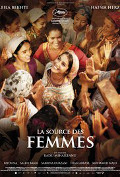
Belgium/Italy/France 2011
Directed by
Radu Mihaileanu
135 minutes
Rated MA
Reviewed by
Sharon Hurst

The Source
Synopsis: In a remote Arab village the woman must make a daily trek to the well to get water. Many women have suffered miscarriages as a result of slipping on the steep ground, and finally they have had enough of the men doing nothing while they toil and suffer. Leila (Leila Bekhti), married to progressive school teacher Sami (Saleh Bakri), encourages the women to go on a “love strike” – which means no sex for the men until they force the local government to have water piped into the village..
This delightful film, nominated for a Palme d’Or at Cannes, is a real surprise. It is at once funny, touching, inspiring and uplifting. It is a film about Arab women, made by a Jewish man, and with an insightful view into the Arab/Muslim world and the male/female relationships that evolve under the influence of Islam.
Women and water are portrayed as universal symbols - the source of life - with the women also being the source of love and of nurturing. Some of these women don’t fit the standard stereotype of downtrodden chattels, mutely accepting the domination of their men. Leila is a firebrand - outspoken and determined to win her battle. Encouraging her is Mother Rifle, someone to be reckoned with, a well-respected widow, played forcefully by a handsome woman billed only as Biyouna. Opposing Leila’s fight is her mother-in-law (Hiam Abass), who tries to turn her son Sami against Leila.
Whilst it has it large themes, the film also touches upon specific issues such as the village women’s inability to read, the blind adherence to tradition with its embedded prejudices, along with darker issues such as what can only be seen as rape within marriage arising from the men’s belief that sexual submission is part of woman’s role. There are a couple of plot threads that seemed a little unnecessary to me, but all in all the plot is thematically powerful.
The Source was filmed in an isolated village in Morocco and it captures a feeling for the isolation and backwardness of the lives these people. In stark contrast to the aridity and repression is the steaminess and sensuality of the women’s bathhouse. There, with meagre quantities of water, they bathe and tell bawdy tales and plot their course of action. Telling use is made of traditional music, in which the women sing and chant songs which in various ways give expression to their thoughts and feelings. As part of the director’s research he visited North African villages and took inspiration for his screenplay from many of the women he met there and the stories they told. He also studied Arabic and Berber poems to better understand their songs which are rendered using traditional instruments. The result is a convincing authenticity.
As was evident in his previous film, The Concert (2009), Mihaileanu likes to blend a little comedy in with his serious themes and the balance really works well here. With the so-called Arab Spring so central to current Middle Eastern politics, this film has much resonance, but one can only hope that the broader politics of liberation will filter down to women and their rights in what seems to be a terribly oppressive society.

Want more about this film?


Want something different?




